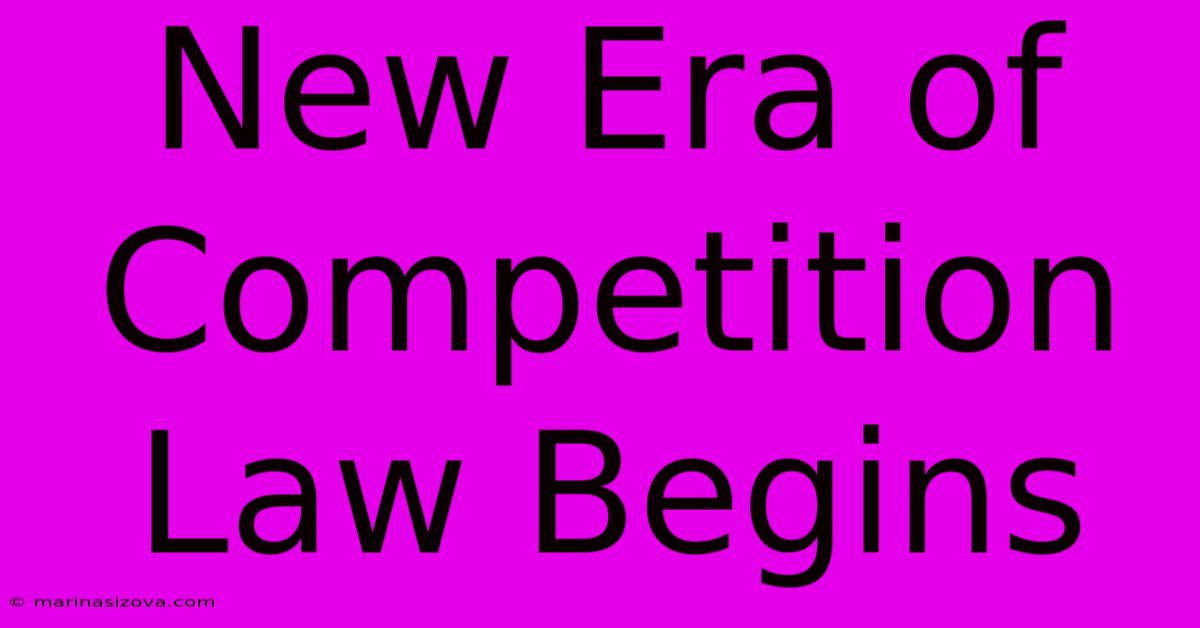New Era Of Competition Law Begins

Discover more detailed and exciting information on our website. Click the link below to start your adventure: Visit Best Website. Don't miss out!
Table of Contents
A New Era of Competition Law Begins: What You Need to Know
The world of business is constantly evolving, and so are the rules that govern it. In recent years, we've seen a dramatic shift in the landscape of competition law, ushering in a new era focused on digital markets and the growing power of tech giants. This shift is driven by several key factors:
1. The Rise of Digital Platforms: Platforms like Amazon, Google, Facebook, and Apple have become dominant forces in their respective industries, influencing consumer behavior and impacting competition across diverse sectors.
2. The Need for Fairness: Concerns about anti-competitive practices like data collection, algorithmic bias, and unfair market advantages have prompted regulators to take a closer look at how these platforms operate.
3. Global Cooperation: International cooperation between competition authorities is becoming increasingly vital as businesses operate across borders, ensuring a consistent approach to enforcing competition law in a globalized marketplace.
Here's what this new era of competition law means for businesses:
Increased Scrutiny and Enforcement:
- Antitrust Investigations: Expect to see more intense scrutiny from competition authorities, focusing on potential violations of antitrust laws, including market manipulation, price fixing, and predatory pricing.
- Data Privacy and Security: Regulations are being tightened around data collection, usage, and sharing, requiring businesses to prioritize data privacy and security.
- Algorithmic Transparency: The impact of algorithms on competition is under the microscope. Expect increased calls for transparency and accountability in how algorithms are developed and deployed.
- Merger Control: The review of mergers and acquisitions will be more rigorous, particularly when involving digital giants or industries where market concentration is a concern.
Adapting to the New Landscape:
- Compliance and Due Diligence: Businesses need to develop robust compliance programs that address the evolving landscape of competition law. This includes keeping abreast of changes in regulations, conducting regular internal audits, and investing in legal expertise.
- Data Protection and Privacy: Prioritizing data protection is crucial. Implement comprehensive data privacy policies, train employees on data handling protocols, and invest in secure data infrastructure.
- Transparency and Fair Practices: Ensure your business practices are transparent and fair, especially when it comes to pricing, customer interactions, and the use of algorithms.
- Proactive Engagement: Engage proactively with competition authorities, demonstrating a commitment to fair competition and open dialogue.
The Future of Competition Law:
This new era of competition law will likely continue to evolve, with a strong focus on:
- Platform Regulation: The development of specific regulations for digital platforms is expected, addressing issues like data ownership, interoperability, and fair access to markets.
- AI and Competition: The impact of artificial intelligence on competition will be a major area of focus, including the development of ethical guidelines and safeguards.
- Global Coordination: International cooperation will be crucial, particularly in tackling issues like cross-border data transfers and the enforcement of competition laws across jurisdictions.
The bottom line: The future of competition law is one of increased scrutiny and regulation. Businesses that embrace transparency, ethical practices, and proactive compliance will be best positioned to navigate this evolving landscape and thrive in the years to come.

Thank you for visiting our website wich cover about New Era Of Competition Law Begins. We hope the information provided has been useful to you. Feel free to contact us if you have any questions or need further assistance. See you next time and dont miss to bookmark.
Featured Posts
-
Chelsea Star Snubs Man Utd With One Word Transfer Reply
Oct 29, 2024
-
Pakjorsel I Gangfelt 18 Aring Skadet
Oct 29, 2024
-
Vw Staenger Fabriker Facket Orolig
Oct 29, 2024
-
Mares Vivas 2025 Thirty Seconds To Mars Abre O Festival
Oct 29, 2024
-
Tyler The Creator W Polsce 2025 Data Miejsce Bilety
Oct 29, 2024
